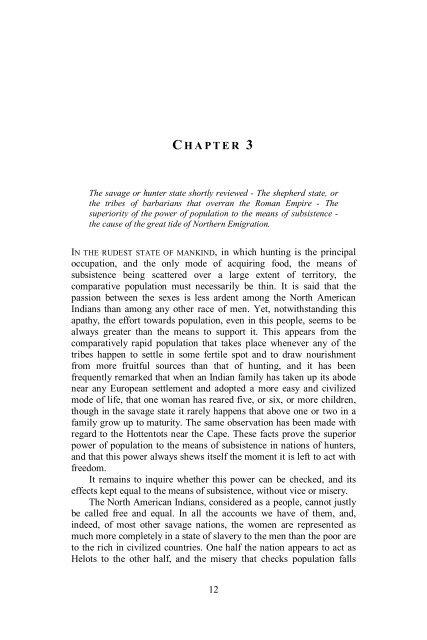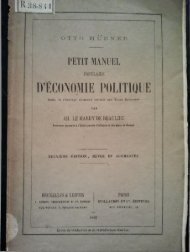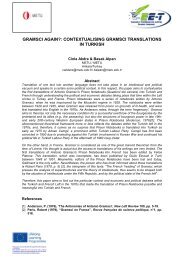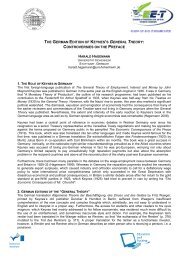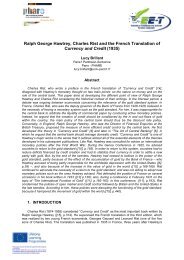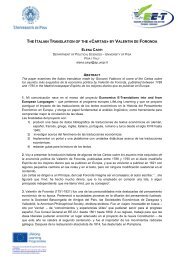Malthus, Thomas, Robert, An Essay on the Principle of Population ...
Malthus, Thomas, Robert, An Essay on the Principle of Population ...
Malthus, Thomas, Robert, An Essay on the Principle of Population ...
Create successful ePaper yourself
Turn your PDF publications into a flip-book with our unique Google optimized e-Paper software.
C HAPTER 3<br />
The savage or hunter state shortly reviewed - The shepherd state, or<br />
<strong>the</strong> tribes <strong>of</strong> barbarians that overran <strong>the</strong> Roman Empire - The<br />
superiority <strong>of</strong> <strong>the</strong> power <strong>of</strong> populati<strong>on</strong> to <strong>the</strong> means <strong>of</strong> subsistence -<br />
<strong>the</strong> cause <strong>of</strong> <strong>the</strong> great tide <strong>of</strong> Nor<strong>the</strong>rn Emigrati<strong>on</strong>.<br />
IN THE RUDEST STATE OF MANKIND, in which hunting is <strong>the</strong> principal<br />
occupati<strong>on</strong>, and <strong>the</strong> <strong>on</strong>ly mode <strong>of</strong> acquiring food, <strong>the</strong> means <strong>of</strong><br />
subsistence being scattered over a large extent <strong>of</strong> territory, <strong>the</strong><br />
comparative populati<strong>on</strong> must necessarily be thin. It is said that <strong>the</strong><br />
passi<strong>on</strong> between <strong>the</strong> sexes is less ardent am<strong>on</strong>g <strong>the</strong> North American<br />
Indians than am<strong>on</strong>g any o<strong>the</strong>r race <strong>of</strong> men. Yet, notwithstanding this<br />
apathy, <strong>the</strong> effort towards populati<strong>on</strong>, even in this people, seems to be<br />
always greater than <strong>the</strong> means to support it. This appears from <strong>the</strong><br />
comparatively rapid populati<strong>on</strong> that takes place whenever any <strong>of</strong> <strong>the</strong><br />
tribes happen to settle in some fertile spot and to draw nourishment<br />
from more fruitful sources than that <strong>of</strong> hunting, and it has been<br />
frequently remarked that when an Indian family has taken up its abode<br />
near any European settlement and adopted a more easy and civilized<br />
mode <strong>of</strong> life, that <strong>on</strong>e woman has reared five, or six, or more children,<br />
though in <strong>the</strong> savage state it rarely happens that above <strong>on</strong>e or two in a<br />
family grow up to maturity. The same observati<strong>on</strong> has been made with<br />
regard to <strong>the</strong> Hottentots near <strong>the</strong> Cape. These facts prove <strong>the</strong> superior<br />
power <strong>of</strong> populati<strong>on</strong> to <strong>the</strong> means <strong>of</strong> subsistence in nati<strong>on</strong>s <strong>of</strong> hunters,<br />
and that this power always shews itself <strong>the</strong> moment it is left to act with<br />
freedom.<br />
It remains to inquire whe<strong>the</strong>r this power can be checked, and its<br />
effects kept equal to <strong>the</strong> means <strong>of</strong> subsistence, without vice or misery.<br />
The North American Indians, c<strong>on</strong>sidered as a people, cannot justly<br />
be called free and equal. In all <strong>the</strong> accounts we have <strong>of</strong> <strong>the</strong>m, and,<br />
indeed, <strong>of</strong> most o<strong>the</strong>r savage nati<strong>on</strong>s, <strong>the</strong> women are represented as<br />
much more completely in a state <strong>of</strong> slavery to <strong>the</strong> men than <strong>the</strong> poor are<br />
to <strong>the</strong> rich in civilized countries. One half <strong>the</strong> nati<strong>on</strong> appears to act as<br />
Helots to <strong>the</strong> o<strong>the</strong>r half, and <strong>the</strong> misery that checks populati<strong>on</strong> falls<br />
12


